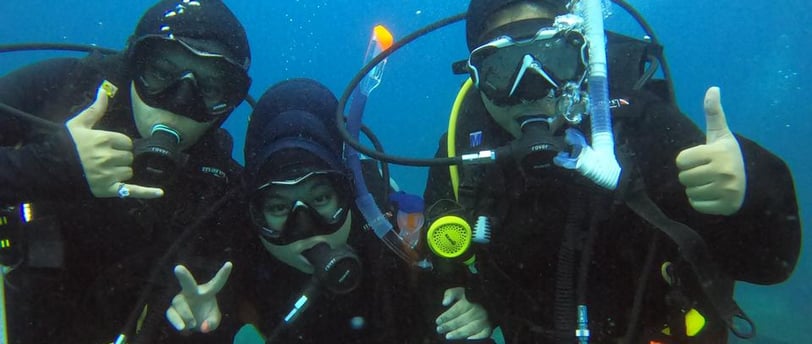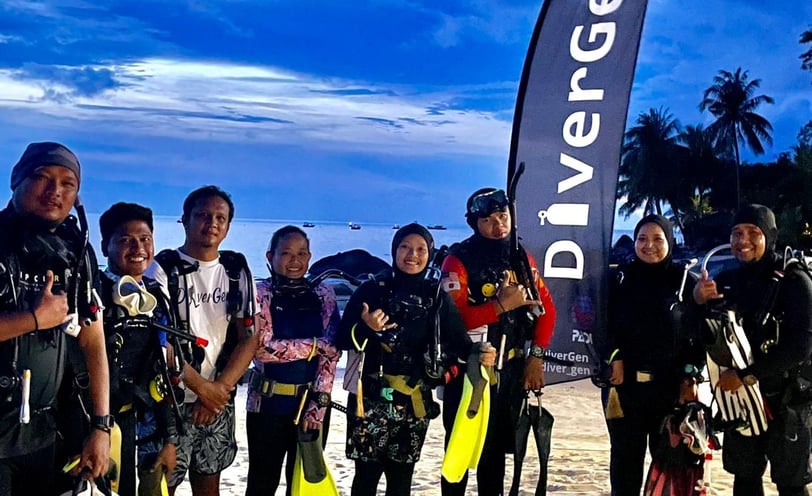The Ultimate Guide to Scuba Diving: Tips for Beginners and Beyond
Are you new to scuba diving and looking for advice to help you get started? Our latest blog post offers essential tips for beginner divers, covering everything from choosing the right gear to mastering buoyancy control. Learn how to plan your dives, practice safety protocols, and stay relaxed underwater. We also share insights on respecting marine life and the environment. Whether you're preparing for your first dive or looking to enhance your skills, this guide will help you build confidence and enjoy your underwater adventures.
DIVE JOURNEY
Author: DiverGen
7/29/20245 min read


Ready to take the plunge into the world of scuba diving? Whether you’re a complete novice or someone looking to refresh your skills, starting with the right foundation is key to a successful and enjoyable diving experience. This guide covers essential tips for beginners, from getting proper training and choosing the right gear to practicing safety and respecting the environment. Dive in with us at DiverGen as we explore the steps to ensure your scuba diving journey is safe, fun, and fulfilling.
Get Proper Training
Enroll in a Certified Course
The first step to becoming a skilled and confident diver is to enroll in a reputable scuba diving certification course. Organizations such as PADI (Professional Association of Diving Instructors), NAUI (National Association of Underwater Instructors), and SSI (Scuba Schools International) offer comprehensive courses designed to equip you with essential diving skills and knowledge. These courses cover everything from basic safety procedures to in-depth knowledge about underwater environments and equipment.
Learn Basic Skills
During your certification course, you'll focus on mastering basic scuba skills. These include:
Buoyancy Control: Learning how to maintain neutral buoyancy is crucial for conserving energy and protecting marine life. You’ll practice using your BCD (Buoyancy Control Device) and adjusting your buoyancy with your breath.
Mask Clearing: You'll learn techniques to clear water from your mask, a skill that is essential for comfort and visibility underwater.
Regulator Recovery: Knowing how to recover your regulator if it becomes dislodged is vital for ensuring a continuous air supply.
These skills form the backbone of safe and enjoyable diving. Regular practice and attention to detail will help you become a more competent diver.
Choose The Right Gear
Invest in Personal Gear
When you’re ready to dive into the world of scuba, investing in your personal gear is a good starting point. Essential items include:
Mask: Choose a mask that fits well and provides a clear field of vision.
Snorkel: A snorkel is useful for surface swimming and conserving air in your tank.
Fins: Invest in fins that are comfortable and suitable for your diving style.
These personal items are crucial for your comfort and hygiene. Having your own gear ensures a better fit and a more enjoyable diving experience.
Rent Before You Buy
For more expensive and specialized equipment such as BCDs, regulators, and dive computers, renting before buying is a smart move. Renting allows you to try different types of gear and determine what works best for you without committing to a purchase. It’s also a cost-effective way to start your diving journey until you’re sure of your preferences and diving style.
Practice Safety
Always Dive with a Buddy
The buddy system is a fundamental principle in scuba diving. Never dive alone, especially as a beginner. Diving with a buddy provides additional safety and support. Before each dive, discuss your plan with your buddy, including details like dive site, depth, and time. Regularly check in with each other throughout the dive to ensure both are comfortable and safe.
Check Your Gear
Before every dive, perform a thorough gear check. Inspect all equipment, including your tank, regulator, BCD, and mask, to ensure everything is functioning correctly. A pre-dive checklist can help ensure you don’t miss any critical checks.
Monitor Your Air Supply
Keep a close eye on your air gauge throughout the dive. It’s essential to monitor your air supply regularly to avoid running out of air unexpectedly. Follow the rule of thirds: use one-third of your air for descent and bottom time, one-third for ascent, and leave one-third as a reserve.
Plan Your Dive & Dive Your Plan
Dive Plan
Planning your dive is crucial for safety and enjoyment. Discuss your dive plan with your buddy before entering the water. This plan should include:
Maximum Depth: Decide on the maximum depth for your dive.
Bottom Time: Agree on how long you’ll stay at your chosen depth.
Route: Plan your route and any key points of interest you wish to explore.
Stick to the Plan
Once you’re in the water, adhere to your plan. Deviating from your plan can lead to unexpected situations or increase the risk of accidents. If conditions change or if you feel uncomfortable, it’s better to abort the dive or modify the plan accordingly.
Start With Easy Dives
Shallow and Calm Waters
For your initial dives, choose locations with shallow and calm waters. These environments are ideal for building confidence and practicing your skills without the added challenges of strong currents or deep depths.
Avoid Overexertion
Keep your first dives short and straightforward to prevent fatigue and stress. As you gain experience and confidence, you can gradually increase the complexity and duration of your dives.
Practice Buoyancy Control
Master Neutral Buoyancy
Buoyancy control is a fundamental skill that affects all aspects of diving. Practice achieving and maintaining neutral buoyancy, which allows you to hover effortlessly underwater. Proper buoyancy control conserves energy, improves air consumption, and helps protect delicate marine environments.
Use Your Breathing
Your breathing plays a significant role in buoyancy control. Deep breaths can help you rise slightly, while exhaling can help you descend. By fine-tuning your breathing, you’ll be able to make small adjustments to your buoyancy and maintain stability underwater.
Stay Relaxed & Calm
Pace Yourself
Underwater movements should be slow and deliberate to conserve energy and air. Rapid movements can lead to fatigue and increase your air consumption. Moving slowly and steadily helps you stay calm and in control.
Don’t Panic
If something goes wrong during your dive, stay calm and composed. Remember the skills you’ve practiced, and use your training to assess and address the situation. Signal your buddy if you need assistance, and follow established procedures to manage the issue effectively.
Respect The Environment
Look, Don’t Touch
Respecting marine life and underwater ecosystems is crucial for conservation and safety. Avoid touching or disturbing marine life and coral reefs. This helps protect delicate environments and reduces the risk of injury to both you and the creatures you encounter.
Be Mindful of Fin Kicks
Be cautious with your fin kicks to avoid stirring up sediment or damaging fragile marine environments. Controlled and gentle fin movements help preserve the clarity of the water and protect the ecosystem.
Continue Learning
Advanced Training
Once you’re comfortable with the basics, consider pursuing advanced training. Courses like Advanced Open Water provide opportunities to learn new skills, explore different dive specialties, and experience more challenging dive conditions.
Stay Informed
Keep up-to-date with the latest diving techniques, safety procedures, and environmental conservation practices. Ongoing education helps you stay current with best practices and enhances your overall diving experience.
Enjoy The Experience
Take Your Time
Scuba diving is as much about enjoying the experience as it is about safety and skill. Take your time to appreciate the underwater scenery and the unique sensation of weightlessness. Relax and immerse yourself in the beauty of the marine world.
Share Your Experience
Connect with other divers to share experiences, tips, and stories. Diving communities and forums can be valuable resources for learning and making new friends who share your passion for underwater exploration.
Whether you’re preparing for your first dive or looking to enhance your skills, these tips will help you build confidence and enjoy your underwater adventures. Dive into your journey with DiverGen and make the most of your scuba diving experience!


Explore
Premier provider of scuba diving experiences and professional courses.
Passion
Ocean
diverlogyventures@gmail.com
+6012-2234432
© 2024 Diverlogy ventures (NS0302402-A) . All rights reserved.

